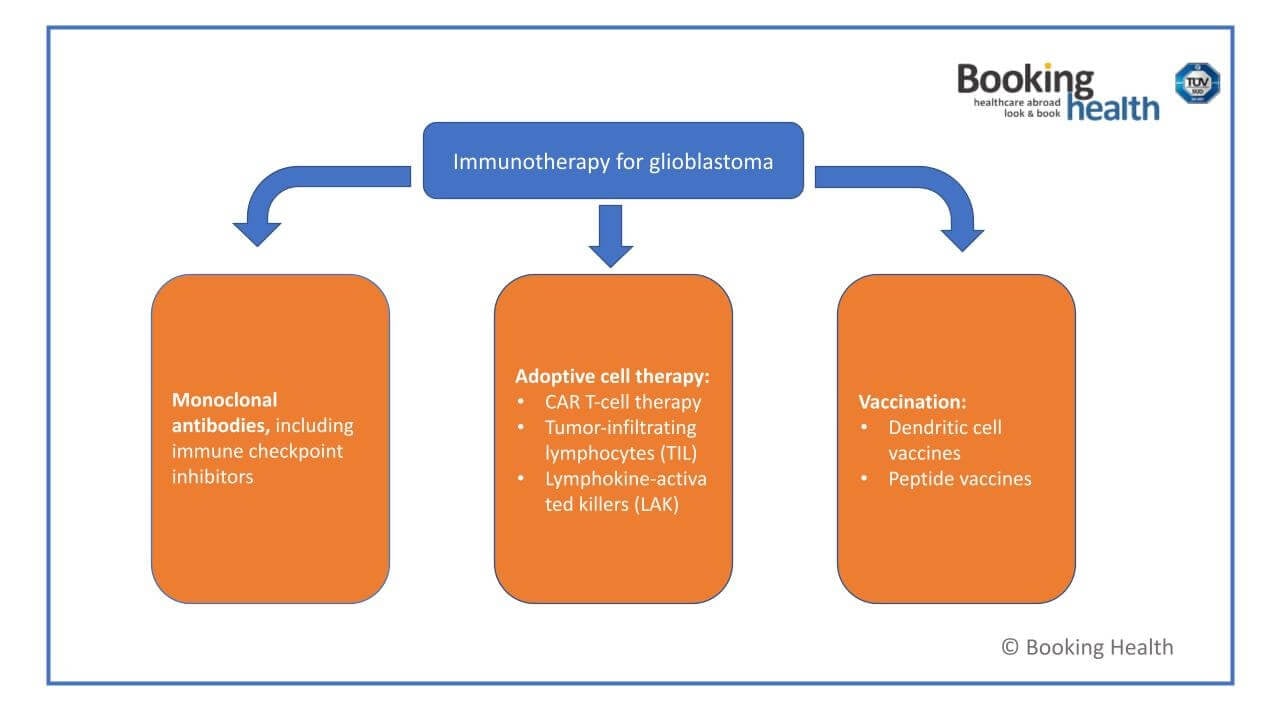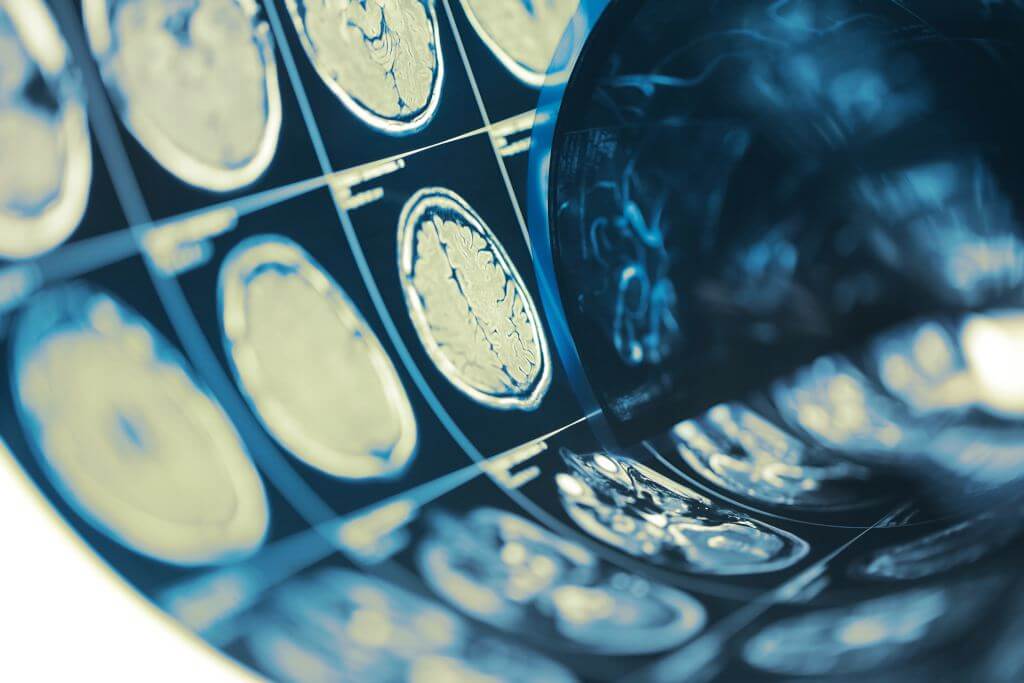Glioblastoma immunotherapy: treatment of brain tumours in Germany
Prof. Dr. med. Frank Gansauge - Head Physician of the Department of Oncology, Immunotherapy and Dendritic Cell Therapy, conducts online consultations about the possibility of Dendritic Cell and Immunotherapy for cancer treatment
Order a consultation - 250 EUR (temporary discount, regular price 1 500 EUR!)
One of the peculiarities of human immunity is the ability to distinguish healthy cells from malignant ones in order to attack and destroy the latter. In brain tumors, this is especially important because surgeons cannot remove a large amount of brain tissue, and radiation therapy and chemotherapy are often not effective enough. Immunotherapy treatment for glioblastoma increases patients' life expectancy and prolongs the relapse-free period after radical surgery in the early stages of cancer. In Germany, doctors actively use immunotherapy at different stages of glioblastoma and achieve high success rates in the treatment of this type of cancer.
Content
- Monoclonal antibodies in the treatment of glioblastoma
- Vaccination for the treatment of glioblastoma
- CAR T-cell therapy for glioblastoma
- How immunotherapy for glioblastoma is performed
- Benefits of immunotherapy for glioblastoma
- Choosing an immunotherapy scheme and treatment
Monoclonal antibodies in the treatment of glioblastoma
The activity of the immune system in the brain is limited because the brain is separated from the rest of the body by the blood-brain barrier (BBB). This means that immune cells and immunologically active substances cannot freely penetrate from the blood vessels into the brain tissue. The initial task of the BBB is to protect the brain from viruses, bacteria and toxic substances. Still, an undesirable side effect is the protection of a malignant tumor located inside the skull from anti-cancer immunity.
Targeted therapy with monoclonal antibodies is one of the options for bypassing the protection of the BBB and introducing ready-made substances with high anticancer activity into the brain. Monoclonal antibodies are synthetic drugs that find unique for glioblastoma molecules in the body and destroy cells with such molecules. Other possible targets are receptors and membrane antigens, which are present in several tissues, but their number in glioblastoma cells is several hundred times higher.
When conducting brain cancer immunotherapy, the targets for monoclonal antibodies are:
- Epidermal growth factor receptor (EGFR)
- Endothelial vascular growth factor (VEGF-A)
- Receptors for certain types of interleukins, such as IL-2R
A special type of monoclonal antibodies is immune checkpoint inhibitors. These drugs target specific proteins and thereby make the tumor visible to the immune system. After the use of immune checkpoint inhibitors, glioblastoma loses its ability to go undetected by the immune system. This group of drugs includes PD-1/PD-L1 inhibitors.
Vaccination for the treatment of glioblastoma
Vaccination is a form of active glioblastoma immunotherapy. This means that no ready-made substances with anticancer activity are introduced into the body; instead, the administered drug stimulates the activation of a person’s anti-cancer immunity. This approach is more beneficial in the long-term perspective since such immunity persists long and allows for:
- Preventing or fighting relapses
- Suppressing the growth of the primary tumor if it cannot be removed surgically
- Destroying invisible micrometastases
Two types of vaccines are used for brain cancer, and these are peptide vaccines and dendritic cell vaccines. Peptide vaccines are often combined with chemotherapy and radiation therapy since the complex treatment regimen gives the best results. Peptide vaccines include components that recognize specific proteins of tumor cells and mark them as targets for a person's anti-cancer immunity. Possible targets for peptide vaccines are the mutant IDH1 gene, which is present only in gliomas, or the mutant epidermal growth factor receptor (EGFR).
In German hospitals, dendritic cell vaccines are used more often. This type of vaccine is made for each patient individually, using his own immune cells. Glioblastoma has long been considered a non-immunogenic (that is, not susceptible to immunotherapy) tumor because the immune system could not recognize tumor antigens and present them to killer cells. Without the presentation of tumor antigens, killer cells are unable to mediate an anti-tumor response.
The dendritic cell vaccine contains a special type of human leukocytes (i.e., dendritic cells) that are isolated from the blood and processed in the laboratory. After cultivation in the laboratory, dendritic cells acquire the ability to recognize tumor cells in a particular person and successfully present them to immune killer cells. After the completion of the full vaccination course, this ability is maintained for several months.
Find specialized hospital & treatment
CAR T-cell therapy for glioblastoma
Adoptive cell therapy is another effective type of passive immunotherapy for aggressive brain tumors. CAR T-cell therapy is a high-tech treatment that involves changing the patient's immune cells at the genetic level. Doctors insert new receptors into immune killer cells, which allows killer cells to attach to glioblastoma and destroy it.
In the first stage of treatment, doctors perform leukapheresis; that is, they harvest leukocytes from the patient's blood. New DNA regions are introduced into the genetic code of leukocytes, due to which the unique CAR specific to glioblastoma will appear on their surface in the future. The ability to synthesize such receptors is preserved in the next generations of leukocytes, and this makes anticancer immunity very stable. The main limitation of the widespread use of CAR T-cell therapy is its high cost. A limited number of laboratories have a license to carry out such genetic manipulations, and the treatment itself is performed only in large university clinics.
In addition to CAR T-cell therapy, there are two more methods with a similar mechanism of action. This is the treatment with lymphokine-activated killers (LAK) and tumor-infiltrating lymphocytes (TIL). The methods do not involve genetic modification of human cells and therefore are simpler and more available in clinical practice. Lymphokine-activated killers (LAK) are patients’ mononuclear cells that are pre-activated with interleukin-2. LAK destroy cells with signs of malignant transformation while not affecting healthy tissues at all.
Tumor-infiltrating lymphocytes (TILs) are immune cells that have managed to cross the blood-brain barrier and accumulate in the tissues surrounding glioblastoma. They are isolated from the material obtained during the surgical removal of the tumor and its metastases. Lymphocytes are purified and cultivated in the laboratory, after which they are injected back into the patient. The principle of this method is that TIL are able to find the remaining glioblastoma cells in the body and destroy them.
How immunotherapy for glioblastoma is performed
Therapy with monoclonal antibodies requires preliminary laboratory testing: doctors look for specific mutations that make the tumor sensitive to this type of treatment. Most drugs are administered intravenously once every 3-4 weeks.
The glioblastoma vaccine in Germany is usually given in a day hospital. The course of treatment involves a series of vaccinations at intervals of several weeks, depending on the type of vaccine (peptide or dendritic cell-based).
CAR T-cell therapy is a one-off procedure. It requires hospitalization because patients first receive high-dose chemotherapy. The chemotherapy lowers leukocyte levels, allowing the injected modified CAR T-cells to multiply more actively and provide stable anti-cancer immunity more quickly. With CAR T-cell therapy, the patient visits the clinic twice: once to donate blood and once in three weeks for treatment.
Lymphokine-activated killers are injected intracerebrally, for the local tumor control. This method is not yet included in glioblastoma treatment protocols, so therapeutic regimens may differ. The use of TILs is also not yet approved by any regulatory agency.
Benefits of immunotherapy for glioblastoma
In glioblastoma, standard therapies cannot ensure long-term survival. Unfortunately, the tumor recurs even after complete removal. But with immunotherapy, the results can be significantly improved. Its benefits in glioblastoma are as follows:
- Reduces the risk of cancer recurrence after surgical treatment
- Increases recurrence-free period
- Increases life expectancy
- Is well tolerated by patients
- Very rarely causes serious side effects
The peculiarity of immunotherapy is the possibility to combine it with other methods of glioblastoma treatment. It is minimally toxic, so it can be used in addition to and simultaneously with chemotherapy, radiation therapy, alternating electric field therapy, and targeted therapy.
| Cancer stage | Response to standard treatment protocol | Response to standard treatment protocol + Immunotherapy |
| Stage 3 | 50% | 70% |
| Stage 4 | 20% | 50% |
Choosing an immunotherapy scheme and treatment
When conducting immunotherapy for glioblastoma, it is crucial to choose the most effective method of treatment for a particular person and include it in the combined therapeutic regimen (for example, treatment with tumor-infiltrating lymphocytes can be performed only after surgery). You also need to make sure that the clinic has access to all types of drugs and treatments and does not just offer the most simple options. If you want to get the best treatment result, you can confidently choose a specialized German clinic.
Booking Health specialists will help you choose a clinic and a doctor for glioblastoma treatment in Germany. Booking Health is the international medical tourism operator that has been helping people with glioblastoma undergo treatment in German cancer centers for more than 12 years. In addition to choosing a healthcare facility, the tasks of Booking Health include:
- Arranging distant preliminary consultations, direct communication with the future attending physician
- Informing about possible treatment options, preliminary elaboration of a medical program
- Exclusion of additional taxes for foreigners from the prices for medical services (saving up to 50%)
- Making an urgent appointment, immediate start of glioblastoma treatment
- Unbiased control of the treatment process by Booking Health doctors
- If necessary, organization of additional examinations, treatments, rehabilitation
- Assistance in purchasing medicines for the subsequent treatment in the native country
- Communication with the clinic, translation of medical reports and recommendations into the patient's language
- Control of bills from the clinic, return of unspent deposit funds
- High-level organizational services: booking accommodation, plane tickets, transfer
- Services of an interpreter and personal medical coordinator
If you want to undergo immunotherapy or complex treatment of glioblastoma in Germany, you can study the information about specialized clinics and average cost of treatment on the Booking Health website or seek help from a company’s medical advisor.
Choose treatment abroad and you will for sure get the best results!
Authors:
The article was edited by medical experts, board certified doctors Dr. Nadezhda Ivanisova and Dr. Vadim Zhiliuk. For the treatment of the conditions referred to in the article, you must consult a doctor; the information in the article is not intended for self-medication!
Our editorial policy, which details our commitment to accuracy and transparency, is available here. Click this link to review our policies.
Sources:
Read:
Cancer immunotherapy in Germany
Treatment of glioblastoma with dendritic cells in Germany
Brain cancer treatments in Germany
Gamma Knife, treatment of a brain tumor in Germany

